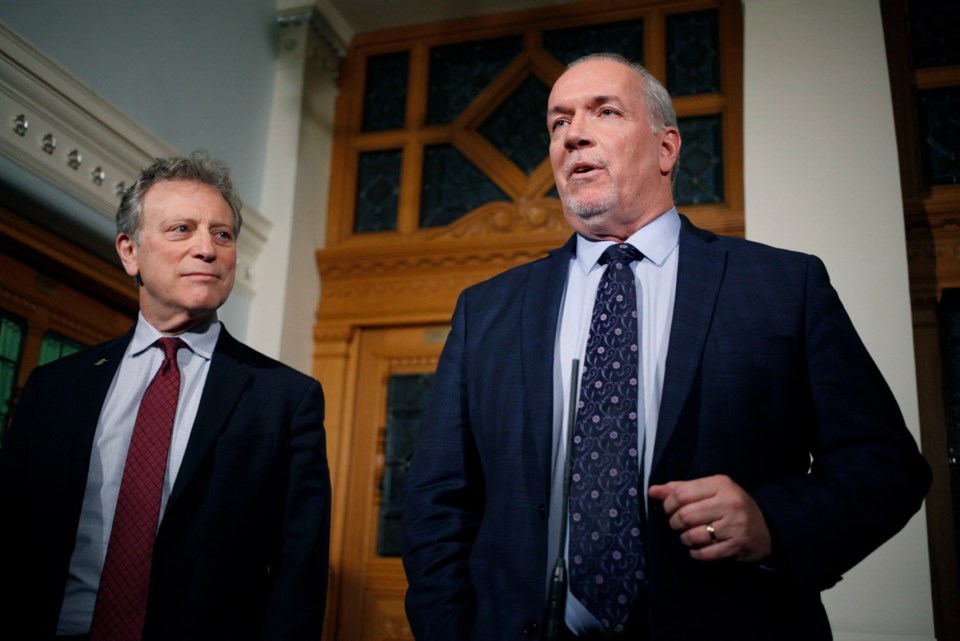Premier John Horgan has rejected the idea of retaliating against Alberta over its boycott of B.C. wines even as he pledged to stand up for vineyards on Vancouver Island and across the province.
Horgan told a news conference in Victoria Wednesday that he refuses to get drawn into a trade battle and will focus on child care, housing and other important issues.
“It’s not the government’s intention to respond in any way to the provocation,” he said. “We’re going to focus on the issues that matter to British Columbians and hope that cooler heads on the other side of the Rockies will prevail.”
He stressed, however, that his government will defend vineyards and has already reached out to the B.C. Wine Institute and growers in the Okanagan.
“We stand with our wine industry,” he said.
Alberta Premier Rachel Notley announced the wine ban Tuesday in response to the B.C. government’s ongoing opposition to the Trans Mountain pipeline expansion, which would increase the transport of bitumen from the oilsands to the B.C. coast.
Horgan’s government said last week that it will ask the public for feedback on new regulations to restrict increased transportation of diluted bitumen.
The B.C. government is well within its rights to consult with British Columbians about the potential impact of a spill on the province’s economy and environment, Horgan said.
Vineyard owners on Vancouver Island, meanwhile, reacted with disgust and dismay at Alberta’s boycott.
Xavier Bonilla, who owns Cherry Point Estate Wines in Cobble Hill, said the ban is unlikely to have a major impact on his winery, which sells most of its products at the farm gate.
He expressed concern, however, that the trade dispute could escalate and hurt businesses and consumers in both provinces.
“I think it’s going to affect related sectors, such as hospitality, bed and breakfasts, transportation, restaurants — many things that are associated with wine,” he said.
“Overall, I think the real thing that has to be done is to be good Canadians and to sit down and to talk and negotiate … and to solve things — not just pull things out of a hat, not knowing what the full implications are.”
Andy Johnston, who owns Averill Creek Vineyard in Duncan, said most Island wineries are too small to be hard hit by the boycott.
”I don’t know how much it will affect us,” he said. “I think it’s rank stupidity and again reflects the problems with inter-provincial trade. I mean, to tell me that I have to apply to export my wine to Alberta is nothing short of ludicrous.”
Johnston said Averill Creek only ships into Alberta direct-to-client rather than through the Alberta Gaming and Liquor Commission.
“So this sort of ban is not going to affect us — other than the individual inclination of the Albertan who says, ‘Oh, I’m not going to buy any B.C. wine.’
“To me, it’s just incredibly stupid from the politicians’ point of view. It’s the playground attitude of, ‘Well, I’m taking my toys and I’m going home. You can’t play with my toys.’ I mean, grow up.”
Christle Pope of Unsworth Vineyards in Mill Bay said the ban comes at a bad time because the industry was pushing to open up inter-provincial sales.
“It won’t have a huge impact at this time because we are a small winery and most of our sales are here,” she said. “We do have some sales in Alberta. However, we were looking to expand in that market in the next year or two, so obviously that would be delayed.”
The Wine Institute of B.C. lists 37 licensed wineries on Vancouver Island with 432 acres of grapes planted as of 2014.
The institute reports that 30 per cent of all the wine sold in Alberta comes from B.C. with a retail value of $160 million a year.



